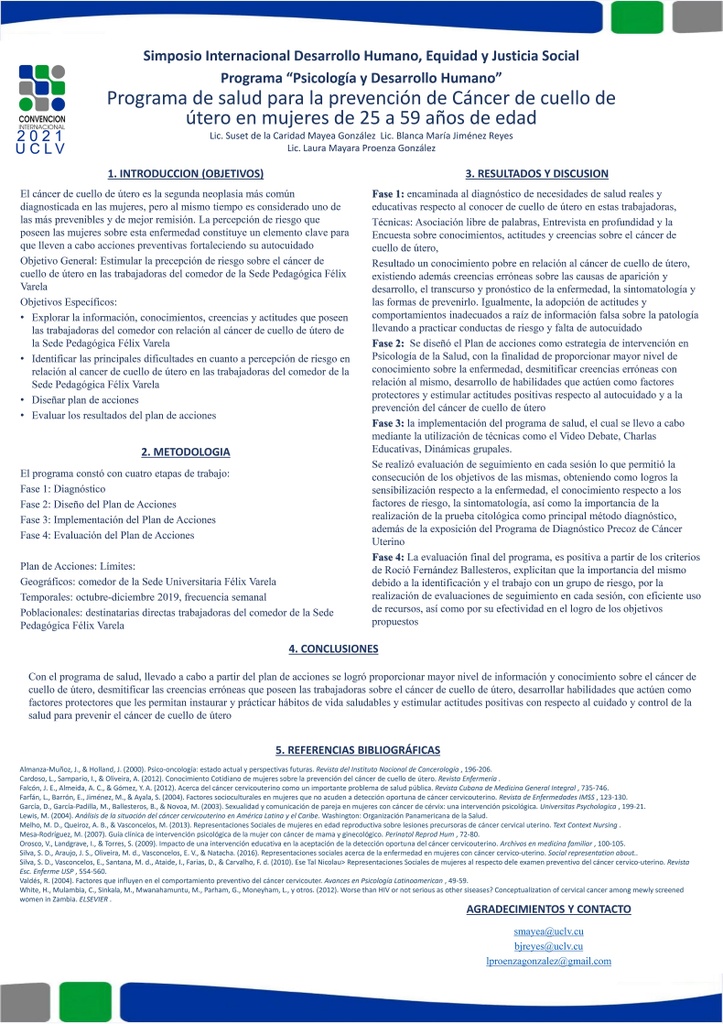Executive Secretary

Simposio Internacional “Desarrollo Humano, Equidad y Justicia Social"

Cervical cancer is the second most common malignancy diagnosed in women, but at the same time it is considered one of the most preventable and with the best remission. The perception of risk that women have about this disease is a key element for them to carry out preventive actions strengthening their self-care, hence the aim of this work is to: stimulate the perception of risk of cervical cancer in the workers of the canteen of the Pedagogical Headquarters Félix Varela, based on a Health Program. For this, 4 stages of work were developed. The first of these, aimed at diagnosing real and educational health needs regarding the knowledge of the cervix in these workers, was carried out using three fundamental techniques: free association of words, in-depth interview and the survey on knowledge , attitudes and beliefs about cervical cancer, which resulted in Poor knowledge regarding cervical cancer, and there are also erroneous beliefs about the causes of its onset and development, the course and prognosis of the disease, the symptoms and ways to prevent it. Likewise, the adoption of inappropriate attitudes and behaviors as a result of false information about the pathology leading to the practice of risky behaviors and lack of self-care. In the second stage, the Action Plan was designed as an intervention strategy in Health Psychology, in order to provide a higher level of knowledge about the disease, demystify erroneous beliefs in relation to it, development of skills that act as protective factors, and stimulate positive attitudes regarding self-care and prevention of cervical cancer. The third stage was the implementation of the health program, which was carried out using techniques such as the Video Debate, Educational Talks, Group Dynamics , and a follow-up evaluation was carried out in each session, which allowed the achievement of the their objectives, obtaining as achievements awareness regarding the disease, knowledge regarding risk factors, symptoms, as well as the importance of performing the cytological test as the main diagnostic method, in addition to exposing the Early Diagnosis of Uterine Cancer. The final evaluation of the program is positive based on the criteria of Rocio Fernández Ballesteros, they explain that its importance due to the identification and work with a risk group, by carrying out follow-up evaluations in each session, with efficient use of resources, as well as for their effectiveness in achieving the proposed objectives.
El cáncer de cuello de útero es la segunda neoplasia más común diagnosticada en las mujeres, pero al mismo tiempo es considerado uno de las más prevenibles y de mejor remisión. La percepción de riesgo que poseen las mujeres sobre esta enfermedad constituye un elemento clave para que lleven a cabo acciones preventivas fortaleciendo su autocuidado, de ahí que el presente trabajo tenga como objetivo: estimular la percepción de riesgo sobre el cáncer de cuello de útero en las trabajadoras del comedor de la Sede Pedagógica Félix Varela, a partir de un Programa de Salud. Para ello se desarrollaron 4 etapas de trabajo. La primera de ellas, encaminada al diagnóstico de necesidades de salud reales y educativas respecto al conocer de cuello de útero en estas trabajadoras, el mismo fue realizado a partir de tres técnicas fundamentales: Asociación libre de palabras, Entrevista en profundidad y la Encuesta sobre conocimientos, actitudes y creencias sobre el cáncer de cuello de útero, las cuales arrojaron como resultado un conocimiento pobre en relación al cáncer de cuello de útero, existiendo además creencias erróneas sobre las causas de aparición y desarrollo, el transcurso y pronóstico de la enfermedad, la sintomatología y las formas de prevenirlo. Igualmente, la adopción de actitudes y comportamientos inadecuados a raíz de información falsa sobre la patología llevando a practicar conductas de riesgo y falta de autocuidado. En la segunda etapa se diseñó el Plan de acciones como estrategia de intervención en Psicología de la Salud, con la finalidad de proporcionar mayor nivel de conocimiento sobre la enfermedad, desmitificar creencias erróneas con relación al mismo, desarrollo de habilidades que actúen como factores protectores y estimular actitudes positivas respecto al autocuidado y a la prevención del cáncer de cuello de útero. La tercera etapa fue la implementación del programa de salud, el cual se llevo a cabo mediante la utilización de técnicas como el Video Debate, Charlas Educativas, Dinámicas grupales, así mismo se realizó evaluación de seguimiento en cada sesión lo que permitió la consecución de los objetivos de las mismas, obteniendo como logros la sensibilización respecto a la enfermedad, el conocimiento respecto a los factores de riesgo, la sintomatología, así como la importancia de la realización de la prueba citológica como principal método diagnóstico, además de la exposición del Programa de Diagnóstico Precoz de Cáncer Uterino. La evaluación final del programa, es positiva a partir de los criterios de Roció Fernández Ballesteros, explicitan que la importancia del mismo debido a la identificación y el trabajo con un grupo de riesgo, por la realización de evaluaciones de seguimiento en cada sesión, con eficiente uso de recursos, así como por su efectividad en el logro de los objetivos propuestos.
About The Speaker

Miss Suset Mayea González
